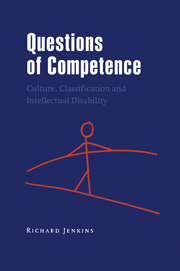Book contents
- Frontmatter
- Contents
- List of contributors
- 1 Culture, classification and (in)competence
- 2 Mental disability in the United States: an interactionist perspective
- 3 (In)competence in America in comparative perspective
- 4 Risk, resilience and competence: parents with learning difficulties and their children
- 5 Constructing other selves: (in)competences and the category of learning difficulties
- 6 Work, opportunity and culture: (in)competence in Greece and Wales
- 7 Slow cookers and madmen: competence of heart and head in rural Uganda
- 8 States and categories: indigenous models of personhood in northwest Greenland
- 9 Learning to become (in)competent: children in Belize speak out
- 10 Towards a social model of (in)competence
- Bibliography
- Index
8 - States and categories: indigenous models of personhood in northwest Greenland
Published online by Cambridge University Press: 16 January 2010
- Frontmatter
- Contents
- List of contributors
- 1 Culture, classification and (in)competence
- 2 Mental disability in the United States: an interactionist perspective
- 3 (In)competence in America in comparative perspective
- 4 Risk, resilience and competence: parents with learning difficulties and their children
- 5 Constructing other selves: (in)competences and the category of learning difficulties
- 6 Work, opportunity and culture: (in)competence in Greece and Wales
- 7 Slow cookers and madmen: competence of heart and head in rural Uganda
- 8 States and categories: indigenous models of personhood in northwest Greenland
- 9 Learning to become (in)competent: children in Belize speak out
- 10 Towards a social model of (in)competence
- Bibliography
- Index
Summary
In recent years the medical anthropology of the Arctic has focused increasingly on cross-cultural encounters and conflicts between indigenous peoples and non-indigenous medical practitioners. As O'Neil (1989) has pointed out for the Canadian Arctic, Inuit dissatisfaction with medical care often originates in contexts where medical practitioners misunderstand or ignore the social and cultural experience of the patient. Furthermore, patients are often made to feel responsible for their own illnesses while the socio-political complexities of contemporary Arctic villages are not considered relevant for an understanding of health and illness. In this way, doctors, nurses and others account for illness as a result of a patient's ignorance or lack of formal education (ibid.: 340). So in this way, for example, a patient's illness can be attributable to their ignorance of personal hygiene or lack of knowledge about nutrition and diet, or to their abuse of drugs and alcohol. Similarly, Young (1993: 73–84) argues that health problems afflicting Alaska's Native peoples can only be understood with reference to what he calls the politics of pathology, that is by focusing on linkages between social, economic and political conditions in Native villages and the increasing problems of mental illness, suicide, drug addiction, as well as other health problems. Rather than the individual being made to feel responsible for their condition, Young calls for Western medicine to understand the processes of social change and dependency.
More generally, however, throughout the Arctic the cross-cultural encounter is one where indigenous knowledge about human well-being is subverted and replaced by dominant forms of Western medical knowledge.
- Type
- Chapter
- Information
- Questions of CompetenceCulture, Classification and Intellectual Disability, pp. 176 - 193Publisher: Cambridge University PressPrint publication year: 1999
- 2
- Cited by



